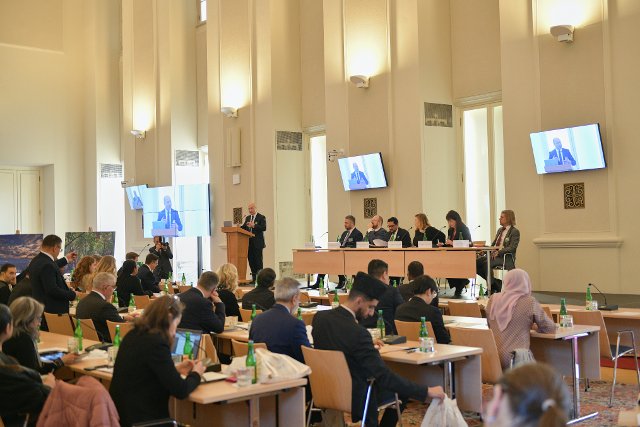
Intercultural and Interreligious Conference: Seeking Understanding in Times of Crisis
14.11.2024 / 17:07 | Aktualizováno: 14.11.2024 / 17:46
This year's Intercultural and Interreligious Conference was held at the Ministry of Foreign Affairs on Thursday, 14 November 2024. Participants sought ways in which dialogue can help restore peace and counter radical ideologies and Islamophobia. One hundred fifty personalities from diplomacy, politics, academia, and NGOs attended the international conference.
Special Representative for Holocaust Affairs, Interreligious Dialogue, and Freedom of Religion, Rober Rehak, opened the conference, followed by the Deputy Minister of Foreign Affairs of the Czech Republic, Eduard Hulicius, who presented the critical areas of
the meeting: the need for respect and empathy in the joint fight against hatred and prejudice. During the opening panel, Sheikh Al Mahfoudh Bin Bayyah, Secretary General of the Abu Dhabi Peace Forum in the United Arab Emirates, addressed the audience
with an appeal to the duty to strive for peace: "Peace is not a job; it is a duty." In his speech, he went on to highlight how hatred is often associated with religion, but also the threat to peace posed by the nuclear arsenals of the great powers. The thematic panel on
anti-Islamism and Islamophobia focused on the stereotypical portrayal of the Muslim community. Surinderpal Kaur, Dean of the Faculty of Linguistics at the University of Malaya, highlighted the many forms and levels in which Islamophobia appears, but also
the problem of monolithic portrayals of Islam and the Muslim community: "We need to present positive Muslim voices and support narratives that oppose Islamophobia." The meeting aimed to reflect on the possibilities of dialogue in times of crisis,
international conflicts, and radicalization that fuels hate. The participants' contributions and individual discussions proved that the cooperation of various social actors can contribute to the fight against radical ideologies and peace-building. The key is
emphasizing inclusive policies, education development, and active networking among other communities. Religious actors and organizations have an essential role in such dialogue. The Ministry of Foreign Affairs and the Institute of International Relations
Prague organized the conference with the IRF Secretariat, Templeton Religion Trust, Anna Lindh Foundation, and LYNC.




